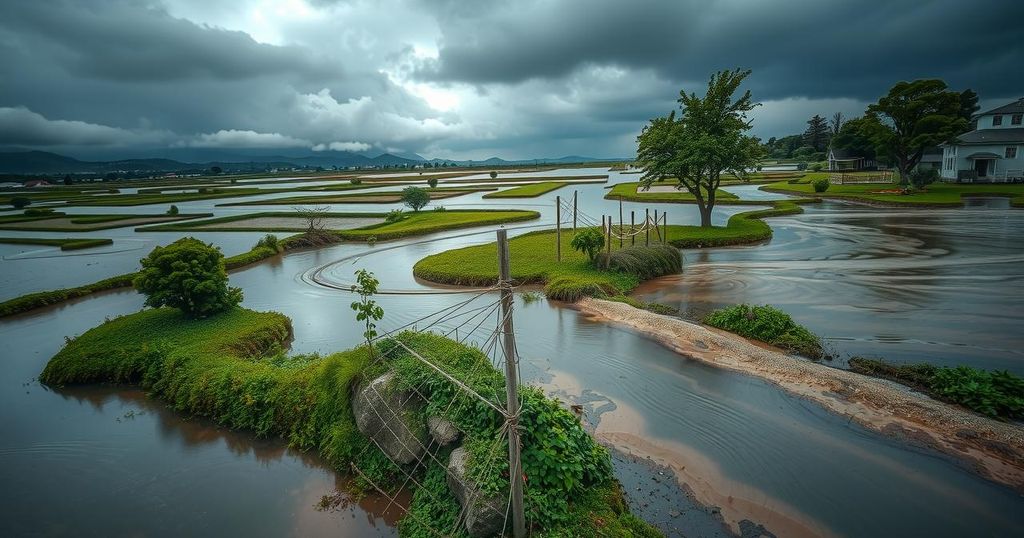Climate Change-Induced Flooding Threatens Lives and Livelihoods in Africa

Climate change is exacerbating flooding across Africa, significantly impacting millions, particularly in Nigeria’s Kogi State, where such disasters have become an annual occurrence. The United Nations reports that 6.9 million individuals have been affected by floods in West and Central Africa in 2024, with experts warning that ongoing climate change will only increase the frequency and severity of such events. Immediate global action is required to address the systemic issues related to emissions and urban development.
In Lokoja, Nigeria, severe flooding has become a persistent problem, affecting local residents like 67-year-old Idris Egbunu annually for over a decade. Each rainy season, the Niger River overflows, inundating homes and necessitating extensive repairs before residents face the same ordeal again. Flooding now poses a significant threat to millions across Africa, driven by the impacts of climate change, which have altered weather patterns and resulted in increasingly severe inundations. In 2024 alone, floods have impacted approximately 6.9 million people across West and Central Africa, according to the United Nations Office for the Coordination of Humanitarian Affairs (OCHA). Reports indicate that flooding conditions worsened dramatically in Kogi State after 2012, resulting in Nigeria’s most significant floods in a decade in 2022, which claimed over 500 lives and displaced approximately 1.4 million. Despite this year’s floods not reaching those catastrophic levels, local officials express concern about ongoing water level increases. Sandra Musa, an emergency agency adviser to the Kogi state governor, remarked that the situation was “very, very bad.” Consequently, residents such as Fatima Bilyaminu, forced to use boats to access their homes, face significant losses as rising waters threaten their belongings. Despite contributing only 4% of global greenhouse gas emissions, Africa faces disproportionately severe effects of climate change. This year has been recorded as possibly the hottest on record, with unusual rainfall patterns leading to extreme weather events. Reports state that significant rainfall has caused widespread flooding in countries across West Africa, including Chad, Niger, Cameroon, Guinea, and Mali, resulting in thousands displaced and homes destroyed. Experts note that the frequency and severity of flooding have transformed from a decadal to an annual cycle, emphasizing the urgent need for action against climate change. Failure to address the reliance on fossil fuels will further worsen these conditions, with up to 118 million Africans living in poverty projected to face extreme weather by 2030. To mitigate these impacts, experts advise that measures must be taken at a global scale to reduce greenhouse gas emissions, confronting the challenges of urbanization and climate resilience. The ongoing situation highlights the pressing need for improved infrastructure and action to address climate change’s impact on vulnerable communities throughout Africa.
The article discusses the escalating problem of climate change-induced flooding in Africa, particularly in Nigeria’s Kogi State. It highlights the increasing frequency and severity of floods over the past decade, contrasting historical patterns of flooding which occurred every decade with the current annual incidences afflicting millions. The piece also brings attention to the disproportionate impact of climate change on African nations that contribute minimally to global greenhouse gas emissions yet suffer severe consequences. It incorporates statistical data from the United Nations and expert opinions from climate change authorities.
In summary, the continuous and worsening flooding in Africa, exacerbated by climate change, poses dire challenges to the region’s inhabitants. Millions are affected each year, as rising waters destroy homes and threaten food security. Experts urge immediate global action to mitigate greenhouse gas emissions and adapt to the escalating climatic challenges to protect vulnerable populations in Africa.
Original Source: www.rfi.fr






